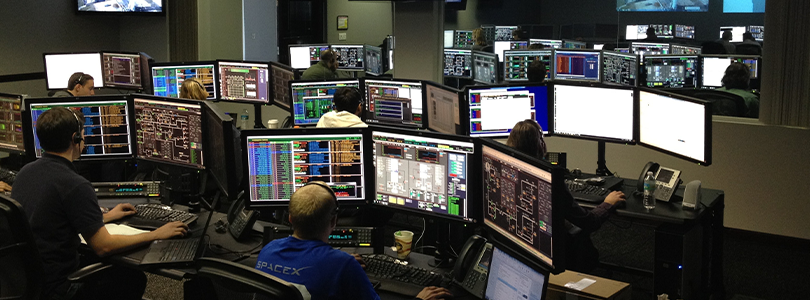The information and communications technology (ICT) sector predicts to use 20 percent of all the world’s electricity by 2025 and emit up to 5.5 percent of all carbon emissions.
Data centres use vast amounts of electricity to keep up with the computing power required for even a single data floor, before the infrastructure of the cooling system is even considered. It is imperative to maintain optimal climate conditions for data centres to function efficiently and to prevent any risk of overheating and outage, hence the important nature of an effective cooling system.
Data centres are only going to scale up in the years to come, further driving up running costs and utility bills. So imagine if there was a solution to produce cheaper electricity and benefit from a more efficient way to cool equipment. Better still, a reliable, affordable power source that helps to reduce carbon footprint. Enter CHP.
Introducing CHP – The Future of Datacentre Power Infrastructure?
CHP is a proven and reliable power source, and in the current climate, with businesses under pressure to reduce costs, the ability to create electricity on-site is hugely attractive given how cost-effective it is, especially when compared to relying on the ever increasingly unreliable, National Grid.
Combined Cooling Heat & Power Systems (CCHP), also known as Tri-Generation is the process of generating electricity and heat. Due to the limited traditional heat demands within Data Centres the Low Temperature Hot Water generated is converted to chilled water. This chilled water is essential for data centres as it can provide an abundance of cool air that can be utilised in server rooms.
In order to transfer the hot water from the generator into valuable cool thermal energy the CCHP system will include an absorption chiller. There are various types of absorption chillers.
The operational principle remains similar on all systems.
- For a low pressure system absorption fluid is evaporated. By evaporating the heat it is removes heat from the chilled water.
- Heat in the form of 90°C LTHW from the Generator is used to regenerate the Absorption solution.
- Thus chilled water is generated and fully utilised in place of electric chillers.
This process ensures all the energy from the Generator is captured and utilised, while offsetting a significant amount of electrical power data centres would otherwise use to generate chilled water via electric chillers.
Investing in CHP to Power a Data Centre
CHP has the potential to reduce Data Centre utility bills by up to 40%. For those looking for a quick ROI, payback is delivered in less than three years based on a 40% saving.
To help run your Data Centre more efficiently, CHP will ensure that the Data Centre uses more of the power produced on site, when compared to using more traditional power sources such as obtaining power from the national grid, where energy wastage is high as well as unreliable. Furthermore, a Data Centre using CHP will also reduce its carbon footprint as you are relying on gas engines.
A More Reliable Power Source
CHP can provide increased resilience and energy security to Data Centres along with significantly reduced energy costs. Having a CHP as part of your power infrastructure increases system efficiencies and sustainability. When combined with traditional UPS and backup diesel generators as part of a microgrid, this can ensure a failsafe solution to an industry that cannot compromise on energy security.

Opting for natural gas fuelled power generation, reduces carbon footprint, which is important to many organisations wary of environmental concerns. Gas powered CHPs can assist Data Centres in not only addressing energy costs but have a major impact on reducing CO2 emissions.
In addition to this, surplus energy produced on site can be sold back to the grid, providing a new revenue stream for your business.
As a specialist in CHP and having delivered thousands of power solutions to the financial and data centre sectors, Shenton Group is on hand to assess the commercial and technical needs of your CHP or microgrid solution, as well as implement the technology. Our team of experts maintain CHP, generators and UPS systems across the UK, so you can trust us as your energy infrastructure partner, and reap the rewards of using a more reliable and cleaner source of energy.
Key Benefits of CHP
- Reduce carbon footprint
- Reduce energy costs
- Reduce or eliminate dependence on the Grid
- Continuous Power Supply
- Increased energy security
- Free cool thermal bi-product

Reputation Protection
Outages and downtime have a disastrous impact on banking and finance organisations, as banks, trading floors, and financial systems are completely reliant on continuous power. As a society, we depend on data centres and cloud storage to access and manage our money online, and should the power fail, the damage to reputation and revenue of businesses who handle our finances is huge.
Shenton Group has carried out detailed audits and assessments for Data Centre clients for many years, adapting to the growing demands for continuous power to keep the lights on at all times. We have an excellent track record of designing and deploying power solutions, to uphold the reputation of clients in the world of IT, Finance and Banking.
We understand the importance of power security and help to protect operations through the introduction and ongoing maintenance of CHP, and other solutions for when the mains power fails.
Get In Touch
To discover more about CHP and Data Energy microgrids, the environmental and cost savings on offer and to implement a power solution at your Data Centre, get in touch and speak to one of our experienced engineers.

